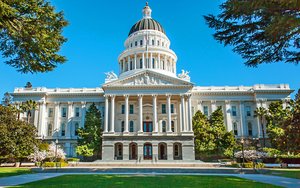
California is asking a federal appeals court to
reinstate portions of the state's Age-Appropriate Design Code, arguing that the law advances the government's interest in protecting minors' privacy.
“The lower court insisted that the
Act is an attempt by the state to engage in content censorship. But the Act is about privacy, not content,” Attorney General Rob Bonta argues in papers filed Tuesday with the 9th Circuit Court
of Appeals.
The statute (AB 2273), passed in 2022,
would restrict the ability of online companies likely to be accessed by minors under 18 to harness minors' data, and to display content to them.
Among other mandates, the statute would require
online companies to configure default settings in a privacy-protective way, unless the business can show a “compelling reason that a different setting is in the best interests of
children.”
advertisement
advertisement
Another provision would require online sites to enforce their content policies.
Other portions would have required online sites likely to be accessed by users under 18
to evaluate whether their services' design could expose minors to “potentially harmful” content, and to mitigate that potential harm.
The tech industry group NetChoice sued over
the law, arguing it unconstitutionally restricts speech.
U.S. District Court Judge Beth Labson Freeman has sided with NetChoice twice. First, in 2023 she blocked the entire law.
California appealed that ruling to the 9th Circuit, which upheld the block on the provisions regarding “potentially harmful” content, but returned the case to Freeman with instructions
to further analyze the other provisions.
This March, Freeman blocked the remaining provisions of the law -- in part, because she found them too murky.
For instance, she wrote, the
requirement to use privacy-protective settings unless other settings are in minors' “best interests” is unconstitutionally vague.
“The phrase 'best interests' is not defined
in the Act,” she wrote. “Without an understanding of that phrase’s meaning, covered businesses will not have notice of what conduct is proscribed and what conduct is permitted, as
required to satisfy the constitution.”
Among other arguments, state Attorney General Rob Bonta now argues the “best interests” standard is not unconstitutionally vague
because it's commonly used in family court.
“This phrase -- 'best interests of children' -- is a legal term of art with a long pedigree in family law,” California argues, adding
that the standard is used in child custody disputes and juvenile delinquency proceedings.
When Freeman enjoined the law, she also said the provision requiring companies to enforce content
policies is “impermissibly vague” because those policies are subjective.
As an example, she cited a New York Times policy from 2017 that told commenters to use
“respectful language,” and then posed the rhetorical question: “If the New York Times publishes content criticizing the California Attorney General for draconian censorship, will the
California Attorney General deem that 'respectful?' Will his successor?”
Bonta says he isn't immediately asking the appeals court to reinstate the provision requiring companies to
enforce their content policies, but will seek to restore that provision in the future.